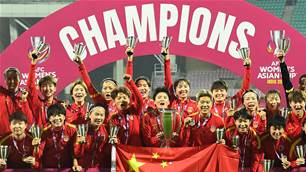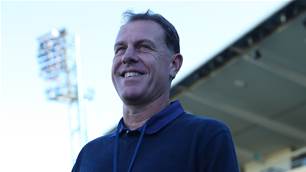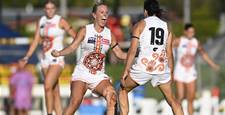Panama may have fallen to a superior Brazil in its FIFA Women’s World Cup debut in Adelaide’s Hindmarsh Stadium, but Las Canalera’s exploits in 2023 go a lot further than three points according to coach Nacho Quintana and his players.
In a football world where attention largely belongs to the extensive history of European nations, the breathtaking flair of South American players, and the deep pockets of Middle Eastern investors, a small Central American country has made its own waves in the world game over the past five years.
The global recognition began in 2018 for Panama when Hernán Darío Gómez’s side reached the FIFA Men’s World Cup for the first time in the tournament’s history. Despite suffering three defeats, Los Canaleros made history for their nation by representing Panama at the pinnacle of football.
After falling at the final hurdle in the 2019 FIFA Women’s World Cup qualification process, Panama qualified for Australia and New Zealand 2023 via Interconfedaration Play-Off wins over Papua New Guinea and Paraguay to match the achievements of their male counterparts.
Panama was drawn in Group F alongside global football giants Brazil and France, with Jamaica, the side that cost it qualification to the 2019 competition, rounding out the group.
Before his side kicked off its tournament against Brazil at Hindmarsh Stadium, coach Nacho Quintana stated what made his side the most dangerous was its “happiness,” outlining that it is important that regardless of the results of the games his side’s goal was to showcase the Panamanian culture.
¡FOTO PARA LA HISTORIA🤩!
— FEPAFUT (@fepafut) July 24, 2023
La postal📸 de nuestro primer equipo titular en la historia en una Copa del Mundo🏆🙌🏼.
⏱️2️⃣3️⃣’ de partido.
🇧🇷1-0🇵🇦
🏟️ Hindmarsh Stadium
📺 @TigoSportsPA @deportes_rpc @tvmaxdeportes #TodosyTodasSomosPanamá🇵🇦 pic.twitter.com/4BhaZbwEIu
Midfielder Aldrith Quintero doubled down on her coach's words before the clash against Brazil when speaking to the press
“When you say Panama, Panama is happiness, it is everything for us,” Quintero stated.
“Getting to the World Cup is something we have dreamed of for ages, when you say Panama, you mean happiness. Some of us couldn’t believe it, but it is a dream we have achieved. When we win, when we lose that is what we represent all the time.”
That rhetoric was put to the test after facing a reality check at the hands of Brazil in Adelaide. World Cup debutante Ary Borges put Panama to the sword, scoring three of the Seleção’s four goals, while magnificently assisting the other.
After the match, Nacho Quintana admitted the reality of Panamanian football saw it enter this tournament with objectives starkly different from those of a nation like Brazil. He stated that he believes his team is better than the final scoreline reflected, but his squad’s job was to be a spark of inspiration for the next generation.
“Our reality is not 4-0, there is definitely room for improvement, but our objectives are to grow, to be better in the game, and to also get many girls in Panama motivated to see that this is possible,” he stated.
To be able to do that, the Panamanian player must be able to keep their spirits high, something which the coach congratulated them for after the game, despite a run of tough results and an extended period away from home.
“The truth is I have 23 possible Therapists in terms of the future, each of them is a contributor. When you live with them on a day-to-day basis, we have been together for 40 days, we have been digesting blows against Spain, Japan, and now this, you realise that, of course, there is a limit.
“Despite that, the players know there is a future there, there is another day to keep on working. There is no time whatsoever to cry, no, we need to play the upcoming match as we did today.”
Panama sing their national anthem at #FIFAWWC for the 𝐟𝐢𝐫𝐬𝐭 𝐭𝐢𝐦𝐞 and it's so damn special 😭
— Optus Sport (@OptusSport) July 24, 2023
Tears flow for the World Cup debutants in Adelaide ❤️🇵🇦
LIVE | https://t.co/OcIiqqjhex#OptusSport pic.twitter.com/AVDsol7MeG
Qualifying for the World Cup may have been a dream come true, but before his side’s match against Brazil, Quintana outlined how important this project’s legacy is by discussing the effects that just qualifying had on the Latin American country's grassroots football community.
“Our dream is not just to get to the World Cup, the dream begins when we go back to Panama, the dream of being able to see more girls play football,” Quintana shared on his side’s role in inspiring the next generation.
“We can see it now happening, there is a festival now happening in Panama for women’s football and there are 100s of girls training on the pitch we used to train, that is the dream. Getting to the World Cup was very exciting but we are excited about what is going to happen afterwards, this is the first one of many more that Panama will surely have an that is why we need to be responsible for motivating them.
“Motivating parents so they can support them, and that they can see that they can be successful through football, that is the flag that we need to carry, the Panama one but those of the parents that want their children to be successful. Why can’t football be the means to be successful?”
The next generation of Panamania footballers have now seen their heroes qualify for their first-ever World Cup, and compete against some of the world’s best while showing their affection for their country and maintaining their spirits.
Las Canaleras take on Jamaica and France, and while they will be hoping to earn their first World Cup points, and record their maiden goal in the tournament, Panamanian football is well and truly making waves for its next generation of players be it male or female.
Related Articles

China PR win 2022 AFC Women's Asian Cup in dramatic final













